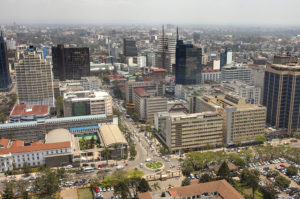Experts have expressed worries that the agendas of the forthcoming Africa Climate Week is built on false solutions, rather than being pro-people.

The experts raised the concern during a webinar on “How Just is the Transition in Africa?” organised by the Environmental Rights Action/Friend of the Earth Africa (ERA/FoEA) on Wednesday, August 23, 2023.
The Africa Climate Week (ACW) 2023 is scheduled to take place between Sept. 4 and Sept. 8 in Nairobi, Kenya, alongside Africa Climate Summit, also hosted by the Kenyan Government.
In their submissions, the speakers, drawn from South Africa, Democratic Republic of Congo, Zimbabwe and Nigeria, argued that the agenda offered nothing, but false solutions to the many climate issues caused by mining on the continent.
These, they said, had remained an albatross pushed by the “greed of filthy lucre” by both African governments and their former colonial masters.
In her remarks, Tyler Booth, Energy Programme Coordinator/Friends of the Earth International Climate Justice, listed some of the false solutions to include the calls for cobalt markets and driving regrowth for global energy needs.
She noted as well that pioneering the future of nature through its commodification and the drive for blue economies and lack of specific push for liveable cities are anti-people agendas.
Booth argued that Africa does not need carbon markets; rather the continent needs real climate finance.
“Carbon markets are dangerous distractions and do not offer a financial solution that will reach grassroots communities already feeling the impacts.
“The anticipated blue economy is a commodification of nature while the promotion of liveable cities is focused on African cities to the detriment of Africa’s rural areas.
“Data from the World Bank estimates that 58 per cent of the total population lives in rural areas in sub-Saharan Africa.
“But in Africa, over 400 million people live in rural areas,” she said, adding that transforming Africa’s food system requires food sovereignty and agroecology.”
Meanwhile, Ubrei-Joe Maimoni, who is the Coordinator, Climate Justice and Energy Programme Coordinator, FoEA, bemoaned the state of climate justice in Africa, saying 67 years of oil extraction in the Niger Delta of Nigeria still has people living in polluted environments and complete darkness.
Maimoni, who is also the Programme Manager for Environmental Rights Action/Friends of the Earth Nigeria (ERA/FoEN), said the FoEA believes that a Just Recovery Renewable Energy Plan for Africa is urgently needed to address all the impacts of the multiple interrelated crises across the continent.
This plan, he said, must be built on environmental, social, gender and economic justice.
While calling on the global North not to let Africa burn, the climate activist stated that it is obvious that Africa had witnessed the worst cases of climate disasters – such as cyclone, flooding, drought and desertification among others.
The activist maintained that it is essential that Africa moves away from harmful fossil fuels towards a transformed energy system that is clean, renewable, democratic and actually serves its people.
In her presentation, titled: “How Just is the Transition in Africa?” a supporter of the Don’t Gas Africa and Africa Movement of Movements, Lorraine Chiponda from Zimbabwe, stated that Africa with over a billion people and 55 countries is a home to diverse economies, resources, ecosystems and cultures.
Chiponda noted that decades after independence, African countries continue to face famine, energy poverty, regional conflicts, patriarchal oppression, economic insecurity and debt crises.
These, according to her are increasingly exacerbated by climate change, multi-layered, systemic and structural as well as financial and trade systems development, climate and energy justice.
Other speakers at the webinar lamented the dire effects of mining on Africa which include human rights abuses, land grabbing, environmental degradation, gender oppression as well as the inherent health challenges which continue on a daily basis.
By Usman Aliyu
